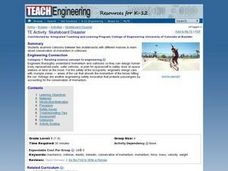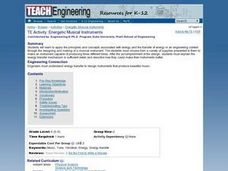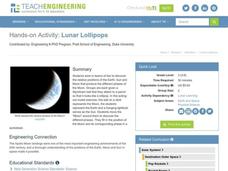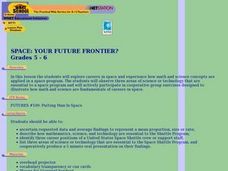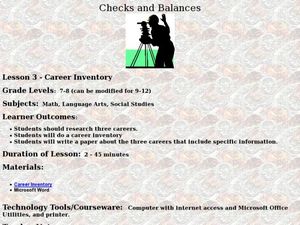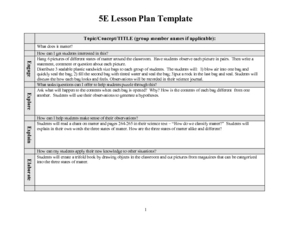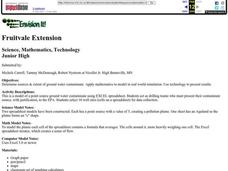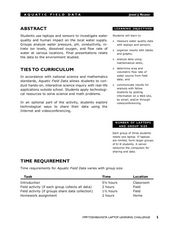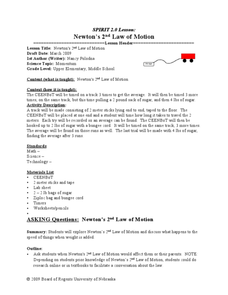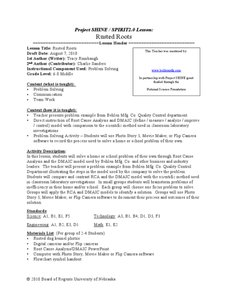Curated OER
Mush! Tracking Travelers on the Trail
Students get to know Alaska and the Iditarod route that is run by dogs as they track the mushers' progress on a map that they create specifically for the race. They learn about latitude, longitude, plotting on a map, checkpoints, and...
Curated OER
Life Skill Communication
Students use digital camera to document the needs for daily living. In this life skills and visual arts lesson, students create class books that include photographs of everyday objects that they use in their home, school and...
Curated OER
Skateboard Disaster
Learners conduct a hands-on experiment with collisions between two skateboards of different masses. They are introduced to the concept of conservation of momentum in collisions and consider how their observations might help engineers...
Curated OER
Energetic Musical Instruments
Students apply the principles and concepts associated with energy and the transfer of energy in an engineering context through the designing and making of a musical instrument. After the accomplishment of the design, students must...
Curated OER
Vector Voyage!
Learners use vector analysis to examine the concept of dead reckoning. They listen to a teacher-led lecture, complete a Vector Voyage Worksheet with the teacher, answer discussion questions, and use the Pythagorean Theorem for speed...
Curated OER
What Did It Cost 100 Years Ago?
Students compare prices of good across the century in order to introduce the topic of inflation. They undertand the concepts of inflation and Consumer Price Index (CPI), use online calculators to figure the approximate cost of goods...
Curated OER
Going the Distance
Students experiment in small groups to answer the question, "Is there a relationship between ramps and speed?" They apply a formula to calculate the speed of the cars used in the experiment, complete the associate lab report, and...
Curated OER
Understanding: Computing
Students examine how a pebble calculator works and compare it to an abacus. After a discussion on the abacus and pebble calculator and how each works, they construct their own pebble calculators. They determine how to represent...
Curated OER
Going...going...gone? Tropical Rainforests-How They Work, What They Do for Us, What's Being Done to Them...
Sixth graders explore the Tropical Rainforest and come to understand what it is and how it affects the ecosystem. In this rainforests lesson, 6th graders write about the Tropical Rainforest, imagine they are in the Tropical Rainforest,...
Curated OER
The Mathematical Implications of Lying
Students explore how statistics can be interpreted in different ways. In this probability lesson students complete a class lab activity then discuss their findings.
Curated OER
Lunar Lollipops
Students work with a partner, Styrofoam ball and light source to simulate the positions of the Earth, Moon and Sun at various stages during the phases of the Moon. They describe why the Moon is visible from Earth and complete a worksheet.
Curated OER
The Westward Movement
Students study the westward movement through examining stamps. For this westward movement lesson plan, students draw conclusions, determine cause and effect relationships and examine the westward movement of the United States by...
Curated OER
Climb Every Volcano
Middle schoolers use a contour map to distinguish the elevation of a volcano. In this volcano instructional activity, students use styrofoam to create the contour of their map. Middle schoolers glue and assemble their...
Curated OER
Rocks and Minerals
Learners bring rocks and minerals from home to investigate in the classroom. In this rocks and minerals lesson plan, students observe all the rocks and minerals brought into the class and answer 7 questions about the features of the...
Curated OER
Space: Your Future Frontier?
Young scholars explore careers in space and experience how math and science concepts are applied in the space program through an interactive video and cooperative group activities.
Curated OER
Career Inventory
Students research three careers and write an essay in which they give specific information about each. In this career lesson plan, students use career finder to discover information about three careers. Students will discuss each career...
Curated OER
What Does It Matter?
Young scholars match definitions with vocabulary words and learn basic facts about matter. Then, they see how to determine the physical characteristics of matter. They determine the mass, volume, and density of objects using appropriate...
Curated OER
Tree I.D.
Students explore various tree species. In this tree species lesson, students collect leaves on nature walks and use Internet sources to identify the trees that the leaves belong to. Students graph their data as well.
Curated OER
Fruitvale Extension
Students determine sources and extent of ground water contaminate, apply mathematics to model in real world simulation, and use technology to present results.
Curated OER
Gravity (Newton's Laws of Motion): A Weighty Subject
Students identify Newton's Laws of Motion. They students explore Newton's Laws of Motion and apply the second law with a classroom activity. The videos will provide visual examples of the effects of gravity while riding on a roller coaster.
Curated OER
Metric Measurements
Sixth graders convert metric units of measurement. Classmates observe the use of a mnemonic for conversions. In groups, 6th graders practice converting metric units. They use a chart to describe how to convert between metric units of...
Curated OER
Aquatic Field Data
Students use laptops and sensors to measure water quality and graph their results. In this aquatics activity students post their results to a website or email.
Curated OER
Newton's 2nd Law of Motion
Students investigate how mass affects the speed of an object. In this physics lesson, students record data on the data table and graph results. They analyze findings and formulate a conclusion.
Curated OER
Rusted Roots
Students create a flowchart on the root cause method. In this inquiry lesson, students compare RCA and the DMAIC model with the scientific method of problem solving. They investigate a problem in school and present their findings in class.


